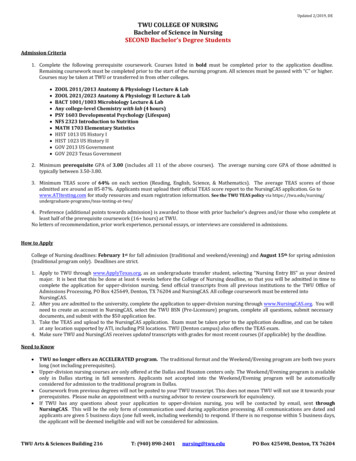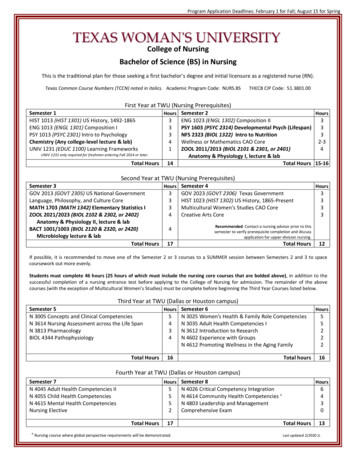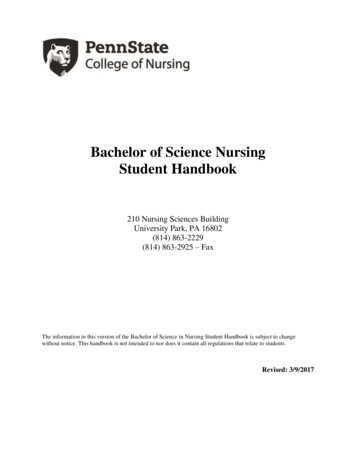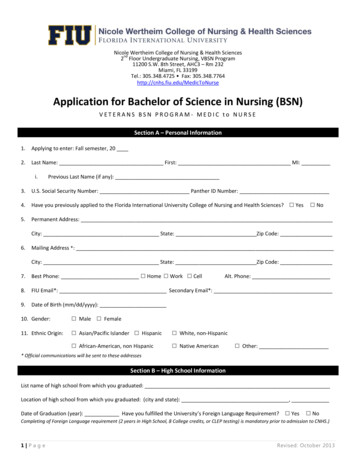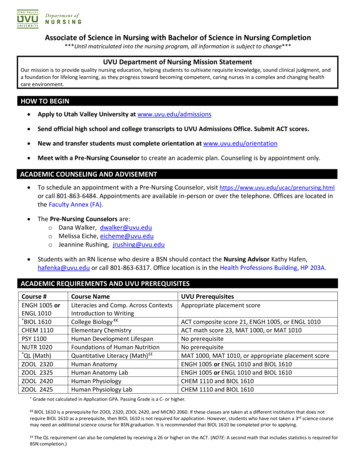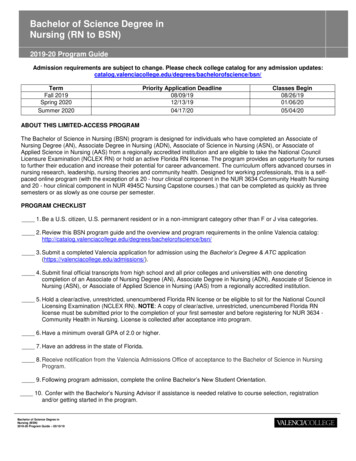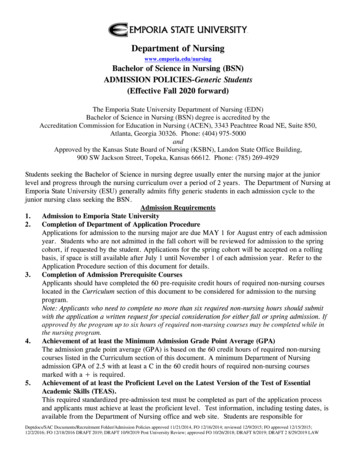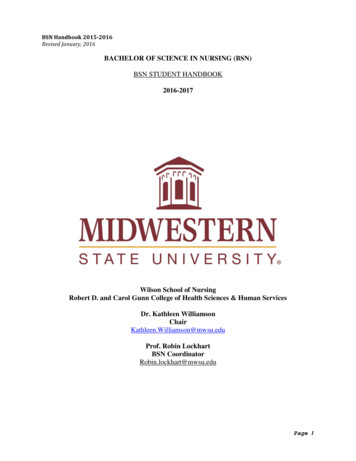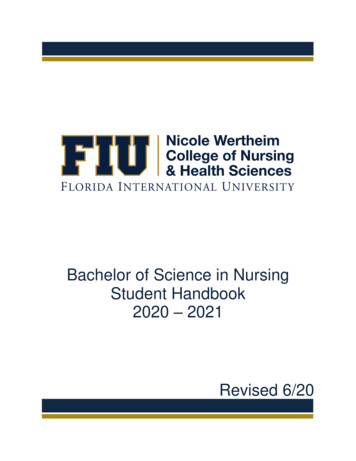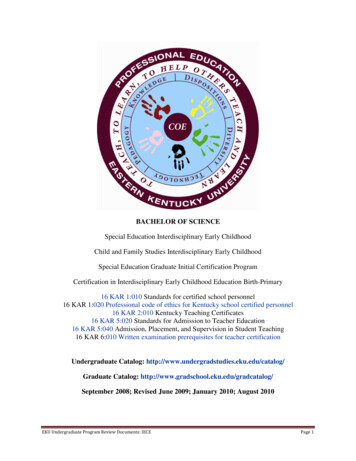
Transcription
BACHELOR OF SCIENCESpecial Education Interdisciplinary Early ChildhoodChild and Family Studies Interdisciplinary Early ChildhoodSpecial Education Graduate Initial Certification ProgramCertification in Interdisciplinary Early Childhood Education Birth-Primary16 KAR 1:010 Standards for certified school personnel16 KAR 1:020 Professional code of ethics for Kentucky school certified personnel16 KAR 2:010 Kentucky Teaching Certificates16 KAR 5:020 Standards for Admission to Teacher Education16 KAR 5:040 Admission, Placement, and Supervision in Student Teaching16 KAR 6:010 Written examination prerequisites for teacher certificationUndergraduate Catalog: te Catalog: r 2008; Revised June 2009; January 2010; August 2010EKU Undergraduate Program Review Documents: IECEPage 1
TABLE OF CONTENTSPROGRAM EXPERIENCESA. Content StandardsB. KERA InitiativesC. EPSB ThemesD. Program FacultyE. SyllabiF. Curriculum Contract/Guide sheetEKU Undergraduate Program Review Documents: IECEPage 2
PROGRAM EXPERIENCESThere are two initial certification degree programs in the area of Interdisciplinary EarlyChildhood Education (IECE) at Eastern Kentucky University. The Bachelor of Science degreeprograms are comprised of two different programs that operate collaboratively with one anotherbut are two, separate, independently functioning programs administered out of two separateColleges. These IECE preparation programs include (1) Special Education Early Childhood inthe College of Education, Department of Special Education and (2) Child and Family Studies outof the College of Health Sciences, Department of Family and Consumer Sciences.The Department of Special Education also houses a graduate level initial IECEcertification program where the candidate takes a combination of undergraduate and graduatecoursework to achieve only certification in IECE. Candidates in this program enter the programwith an undergraduate degree in a related area and a desire to add the IECE teachingcertification, or candidates may enter the program possessing an undergraduate degree in a nonrelated area but have early childhood experience prior to entering the graduate level initial IECEprogram.Upon completion of any of the above programs leading to certification in IECE, acandidate is eligible to be employed as a: kindergarten teacherpreschool teacherearly childhood special educator (age 0-5 years)developmental interventionistinfant-toddler teacherearly childhood parent educatorspecial educator for IEPs and IFSPshome-based early childhood teacheritinerant early childhood teacherBoth Bachelor of Science programs in IECE and the graduate level initial IECE certificationprogram are designed to meet the variety of needs of early childhood educators and serviceproviders to serve all young children, those with and without disabilities / developmental delays.The mission of these programs is to provide quality instruction to prospective early childhoodeducators, produce early childhood educators that will make a positive impact on the lives ofchildren and families, and substantially increase the number and retention of early childhoodeducators who deliver services to children with and without disabilities and their families. Sinceteacher education has been a major focus of EKU since the University’s founding as the StateNormal School, these program objectives are congruent with and promote the Universitymission.The IECE programs share a philosophy that reflects the University and Unit position inteacher preparation, which values commonalties and diversities among individuals in theiraspirations, abilities, behaviors and cultures. It also supports the University’s and Unit’scommitment to provide all children with and without disabilities and their families appropriateservices in the least restrictive environment by providing competently prepared early childhoodEKU Undergraduate Program Review Documents: IECEPage 3
educators. It is the responsibility of the faculty to ensure that graduates have up-to-datestrategies and skills essential to serving children and families and that they are able to supportlearning for all students and their families from diverse populations, cultures, and environmentsregardless of race, gender, ethnicity, socio-economic status, physical or learning disabilities, ornational origin. The development of candidates’ cultural competency is infused in teachereducation coursework as well as field and clinical experiences throughout the teacher educationprogram.The mission of the Special Education IECE program is also compatible with the missionof the College of Education and aligned with the Department of Special Education Faculty andStaff Commitment that states “Our primary commitment is to ensure provision of qualityeducational and related services to individuals with disabilities. Therefore, we strive to preparepractitioners who are competent and share this commitment.”The mission statement of the Family and Consumer Sciences IECE program aligns withthe Department mission “To provide excellent teaching, service and scholarship in theDepartment of Family and Consumer Sciences to prepare professionals and leaders who improvequality of individual, family and community life.”Relationship to the Conceptual FrameworkBoth Bachelor of Science IECE programs and the graduate level initial IECE certificationprogram subscribe to the College of Education’s Conceptual Framework for TeacherPreparation. The model focuses on the integration of content knowledge, effective pedagogicalskills, dispositions, technology and diversity that foster continued professional and personaldevelopment and learning. The foundation that enables a graduate of these programs to work inthe area of IECE is based on the acquisition of “content knowledge” embedded in thecurriculum. The opportunities candidates have to participate in virtual, in-class, and fieldexperiences and to practice their “pedagogical skills” enhance this knowledge. Built into thisframework is the idea that effective educators maintain certain perceptions about themselves,students, and their teaching environment. Candidates are required throughout the program toassess their “dispositions” related to early childhood education and reflect on their abilities,interests, and performance in the teaching milieu. Candidates are knowledgeable of integrating“technology” into instruction to enhance teaching and learning and are able to support learningfor all children and families across an increasingly “diverse” population. Upon successfulcompletion of the required academic and supervised learning experiences, the graduate iscertified to practice as a professional early childhood educator. Graduates of these programs alsorecognize the need to be life-long learners, understanding that to be effective teachers that theirknowledge base must continue to be updated and their skills refined. Content and experiencesthat focus on diversity is integrated into all course syllabi and field experiences to assistcandidates in their understanding and appreciation of the wide array of differences between andamong individuals in our society.EKU Undergraduate Program Review Documents: IECEPage 4
Relationship to Continuous AssessmentBoth departments with IECE programs utilize all possible assessment / data collectiontechniques available and instituted at both Unit and the University levels through Banner, DegreeAudit, Task Stream and TracDat. The IECE programs, as part of Professional Education, houseassessments in Task Stream and regularly update, according to the continuous assessmentschedule, tools, data and data analysis information in TracDat.Through the continuous assessment process, candidates are evaluated according to 6Program Key Assessments (State Licensure Test, Content Assessments, Assessment ofCandidates Ability to Plan Instruction, Assessment of Clinical Practice, Candidate Impact onStudent Learning, and Candidate Self Assessment). These Program Key Assessments aredispersed across the candidates’ course of study. Instituted transition points provide programfaculty with points at which a candidate’s assessment data is reviewed and it is then determinedif a candidate can progress into the next phase of their determined program. These transitionpoints, along with Key Assessments, occur as a candidate enters the Professional EducationProgram, prior to the candidate beginning their student teaching experience, at completion of thecandidate’s student teaching experience, and upon exiting the program.Below are the Program Key Assessments for the Bachelor of Science in Special Education EarlyChildhood and the Special Education Graduate Initial Certification ProgramSED IECE Bachelor of Science and Initial Certification Program Key AssessmentsAssessmentTypeWhere does itoccur in theprogram?CECStandardsAddressed1. Praxis II:#0023Standardized test—State LicensureExamBetween Gates 3and 41, 2, 3, 4, 5, 6,7, 8, 9, 102. Early ChildhoodAssessment ProjectCase StudyBetween Gates 2and 32, 8, 9, 103.IEP and IFSP Projectwith InterventionProgramming4. Student TeachingAssessment-KTIP andPortfolioCase StudiesBetween Gates 2and 31, 2, 3, 9, 10ObservationInstrument andPortfolioBetween Gates 3and 41, 2, 3, 4, 5, 6,7, 8, 9, 105.Unit of studyBetween Gates 3and 43, 4, 5, 6, 7, 8KTIP UnitEKU Undergraduate Program Review Documents: IECEPage 5
6.Child and Family Study ProjectProjectBetween 2 and 39, 10Below are the Program Key Assessments for the Bachelor of Science in Child and FamilyStudies Interdisciplinary Early Childhood Program.CDF IECE Initial Certification Program Key AssessmentsAssessmentTypeWhere does itoccur in theprogram?CECStandardsAddressed1. Praxis II:#0023Standardized test—State LicensureExamBetween Gates 3and 41, 2, 3, 4, 5, 6,7, 8, 9, 102. Early ChildhoodAssessment ProjectCase StudyBetween Gates 2and 32, 8, 9, 103.Case StudiesBetween Gates 2and 31, 2, 3, 9, 10ObservationInstrument andPortfolioBetween Gates 3and 41, 2, 3, 4, 5, 6,7, 8, 9, 10Between 2 and 39, 10IEP and IFSP Projectwith InterventionProgramming4. Student TeachingAssessment-KTIP andPortfolio5.Child and Family Study ProjectProjectDescription of Courses and ExperiencesThe mission of both Bachelor of Science IECE programs and the graduate level initialIECE certification program is to provide quality instruction and practical experiences toprospective early childhood educators, produce early childhood educators that will make apositive impact on the lives of children with and without disabilities and their families,substantially increase the number of early childhood educators ready to serve children andfamilies, and prepare early childhood educators who provide leadership in problem solving andprogram development in the schools, community, and professional organizations. The IECEprogram curriculum is designed to enhance candidate learning and the application of learning inthe field. The majority of the courses in the IECE program have a blended delivery formatincluding face-to-face, online, web-enhanced, and through Interactive Television System to theEKU satellite campuses in Corbin, Danville, Lancaster, and Manchester. All courses have accessto the online instructional support system, Blackboard, to enhance delivery of courseEKU Undergraduate Program Review Documents: IECEPage 6
information. Pedagogical techniques used in the delivery of instruction are aimed at stimulatingthe candidate’s interest and developing their overall knowledge of teaching strategies shown tobe effective with children with and without disabilities. In addition, curriculum planning isdesigned to ensure that candidates are exposed to and begin to meet the IECE Teacher Standardsdesigned by the Kentucky Education Professional Standards Board. The programs in SpecialEducation are aligned with the Council for Exceptional Children New Teacher Standards. Theprogram housed in the Department of Family and Consumer Sciences is aligned to standardsissued by the National Association for the Education of Young Children.The candidates in both Bachelor of Science IECE programs and the graduate initialcertification IECE programs, upon completion of their degree / certification program, are eligiblefor employment in kindergarten classrooms, preschool classrooms, First Steps (the IDEA Part CEarly Intervention System for Kentucky), child care, parent education, etc.Special Education / Teaching Interdisciplinary Early Childhood Education – Special EducationEarly ChildhoodCurriculum requirements include the following: (1) Major 27 hours (SED104, 360, 341, 352,375, 436, 504, 518, 577); (2) Supporting Courses 12 hours (ELE519, NSC500, OTS515,SWK456); (3) Professional Education 16 hours (EDF103, 203, SED499); (4) Minor in Child andFamily Studies 18 hours (CDF235, 246, 327, 344, 346, 437); and (5) General Education 48 hoursand University Requirements 1 hour; for a total of 128 hours.Child and Family Studies Area Major – IECE OptionCurriculum requirements include the following: (1) Major 33-51 hours (CDF132, 235, 236, 246,327, 343, 344, 346, 437, FCS400, NFA317, SWK456); (2) Minor in Special Education 18 hours(SED341, 352, 360, 436, 504, 518); (3) Supporting Courses 6-15 hours (CSC104 or CIS212,OTS515, NSC500); (4) Professional Education 19 hours (EDF103, 203, ELE519, CDF499); and(5) General Education 45 hours and University Requirements 1 hour; for a total of 128-132hours.Special Education Graduate Level Initial IECE CertificationCurriculum requirements include the following: (1) Major 24 hours (SED775, 704, 352, 436,718, 722, 777, 790); (2) Supporting Courses in Child and Family Studies 9 hours (CDF741, 744,746 / 747); (3) Supporting Courses 12 hours (SWK456, ELE719, NSC700, OTS715); (4)Professional Education 8-10 hours (EDF103, 203, SED897); for a total of 53-55 hours.Monitoring of Candidate ProgressAll candidates progress through transition points in their program. For the Bachelor ofScience degree candidate there are four transition points: Entry to Program, Prior to StudentTeaching, Completion of Student Teaching and at Program Completion. These transition pointsensure that candidates have acquired necessary professional and pedagogical content knowledge,skills, and dispositions to become effective educators and progress through the program.Candidates are guided through the process of each transition point during orientations, advising,mentoring, and educational advising. The planned program document (CARES report) iselectronically updated as the candidate progresses throughout the program.EKU Undergraduate Program Review Documents: IECEPage 7
Each IECE program candidate’s progress is monitored by Key Assessments during eachof these transition points. These key assessments are reviewed in each candidate’s TaskStreame-portfolio.Upon admission to Eastern Kentucky University, candidates may choose to major inIECE in either Special Education or in Family and Consumer Sciences. Once candidates havechosen to major in IECE, they are assigned to program faculty who act as their academicadvisors. Candidates, however, are not officially admitted to the program until they havecompleted 60 hours and have met all Teacher Education Admission Requirements. During thetransition between admission to the University and admission to Teacher Education, candidatesare introduced to the professional teaching roles, responsibilities and ethical issues in EDF 103Introduction to Education. Through field observations of primary, intermediate, middle, andsecondary classrooms candidates are also introduced to the Kentucky Teacher Standards andbegin to identify those standards in practice. At this time candidates are also developing contentknowledge and technology skills as they complete their General Education requirements andbegin coursework in their emphasis area. In EDF 203 Schooling and Society, candidates studythe foundations and philosophies of American Education. They are also introduced to theKentucky Program of Studies and Professional Ethics for Teachers. Candidates participate in amentoring project during this course and their professional dispositions are assessed by theirinstructor and field supervisor. Only those candidates who meet the minimum ACT scorerequirements (or equivalent) may enroll in EDF 203.Each semester, prior to registration, candidates must meet with their assigned academicadvisor to ensure course requirements are being met in an appropriate and efficient manner.Course sequencing is recommended by the advisor and the program’s recommended advisingform; sequencing of courses is predominantly dependent on achieving the course prerequisites(such as completing SED104 prior to additional SED courses). Additionally, as demonstratedthrough the Program Key Assessments and transition points, there are gateways through whichcandidates must pass in order to complete program requirements.In both Bachelor of Science IECE programs, candidates are actively involved in fieldexperiences / student teaching. Prior to entry into student teaching, a candidate in the IECEprogram in the Department of Special Education must successfully complete an undergraduatepracticum. This provides the candidate with experiences off of the college campus, in anapproved professional environment or classroom. A candidate in the IECE program housed inthe Department of Family and Consumer Sciences has multiple opportunities within the majorarea courses to have experiences in child care, with families, and in preschool environments priorto entry into student teaching.As well, to culminate their degree / certification program, all candidates mustsuccessfully complete 16 weeks of student teaching. Collaboratively through the College FieldExperiences Office and the candidate’s University Supervisor, two eight-week student teachingplacements are identified for each candidate. Each of these placements provides the candidatewith professional field experiences in their degree / certification areas. For example, a candidatewill have one 8 week experience in a state funded preschool classroom where children with andwithout disabilities are enrolled and a second 8 week experience with a First StepsEKU Undergraduate Program Review Documents: IECEPage 8
Developmental Interventionist providing services to infants / toddlers with disabilities ordevelopmental delays and their families.Since the graduate level program is initial certification, candidates must adhere to theexpectations of Professional Education and meet the basic gate and transition points within thatprogram. For example, graduate initial certification candidates must successfully pass gate #1 byachieving the appropriate admissions requirements into Professional Education. Additionally,gate #2 must be achieved through maintaining the appropriate GPA and completion of the courseassessment in courses such as SED518/718. Lastly, candidates in the graduate level initialcertification must also successfully complete graduate practicum which has equivalentrequirements as the undergraduate student teaching, as described above.Field Experience Chart for SED IECE Initial Certification ProgramsCourseNumberEDF 103Number ofFieldExperienceHours8EDF 20312ELE 51915SED 1044SED518/718SED 352SED 3753390SED 49916 weeksField Experience and PlacementObservation in elementary, middle, and secondary classrooms atModel Laboratory School and area public schoolsObservations and interviews in elementary and/or middle gradeclassrooms at Model Laboratory School and area public schoolsObservations, interviews and assessment activities inkindergarten classrooms at Model Laboratory School and areapublic schoolsObservations and classroom work and lessons with students inelementary classrooms at Model Laboratory School and areapublic schools that serve students with disailitiesObservation, teacher interview, and caregiver
The Department of Special Education also houses a graduate level initial IECE certification program where the candidate takes a combination of undergraduate and graduate coursework to achieve only certification in IECE. Candidates in this program enter the program with an undergraduate degree in a related ar
